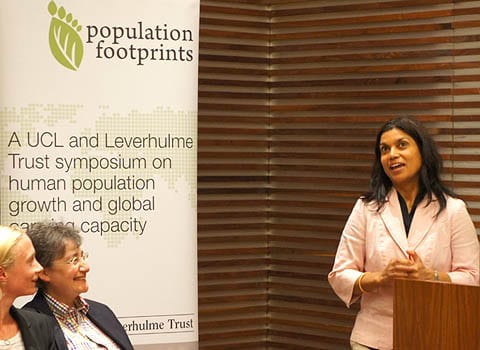The Next Chapter in Development – Goals for 2016 and Beyond
By Sarah J Ball, on 27 July 2011
Back in 2000 the world committed to eight Millennium Development Goals (MGDs) to galvanize efforts to meet the needs of the world’s poorest by 2015. Although significant progress has been made, reaching all the goals continues to be challenging. As 2015 approaches, Mike Rowson (UCL Centre for International Health and Development) led an engaging UCL Institute for Global Health debate on 21 July to explore what we’ve learned from the MDGs and what the next chapter in development should look like.

From left: Lucy Scott (Overseas Development Institute), Karen Newman (Population and Sustainability Network) and Dr Meera Tiwari (University of East London). Credit: Sarah Ball
Karen Newman (Population and Sustainability Network), Lucy Scott from the Overseas Development Institute, Patrick Watt (Save the Children), and Dr Meera Tiwari from the University of East London explored whether the current MDGs should continue, extending the deadline or working towards the targets until they are met.
Alternative suggestions from the panel were for the current MDGs to be used to set local, national and global targets, or to develop different targets for developing and developed countries. But Lucy Scott questioned whether the current MDGs have the right focus. Meera Tiwari wondered whether setting targets risks missing or distorting key issues, and disguises a complex situation. Mike Rowson queried whether we should even have MDGs after 2015.
Meera Tiwari felt strongly that a framework of some kind needs to continue after 2015, but felt there needs to be more of a focus on localised solutions to global problems. She also called for future development discourse to be anchored around environmental sustainability, which was echoed by Karen Newman’s call for more of a focus on food and water security and using the concept of ‘security’ as a framework to focus around.
Karen Newman also called for a focus on reproductive health programmes that respect and protect rights, but interestingly Lucy Scott disagreed, concerned that pushing for a rights-based approach might have less political support and might mean some countries were unable to commit to any new goals framed in this way.
Patrick Watt praised the MDGs for defining progress in a more holistic way, and as an excellent advocacy tool for mobilising resources, political will and consensus, but emphasised the need to learn from the shortcomings of the current goals before the political agenda for post 2015 goals starts in 2013. He felt progress has not focused on all levels of society, leading to increasing inequalities. The US, Japan, the World Bank and IMF don’t appear to have fully committed to the MDGs. Accountability towards meeting MDG targets has been poor, and it has been hard for global ambitions to be translated at the local level.
Although Nora Groce (Leonard Cheshire Disability & Inclusive Development Centre at UCL) highlighted that there is a mechanism and organisational processes for affecting the future development of MDGs, there was a clear feeling amongst the rest of the audience and the panellists that it was very difficult to influence these discussions and decisions. How can southern civil society provide their perspective to influence the future of MDGs?
We live in a complex world with so many different opinions and so much information available now, I feel pulling it all together into a consensus with a revitalized focus on poverty for 2016 and beyond will be a hard task.
Sarah Ball is the Research & Programme Development Manager at the UCL Institute for Global Health.
 Close
Close

